We may not have the course you’re looking for. If you enquire or give us a call on +800 312616 and speak to our training experts, we may still be able to help with your training requirements.
Training Outcomes Within Your Budget!
We ensure quality, budget-alignment, and timely delivery by our expert instructors.
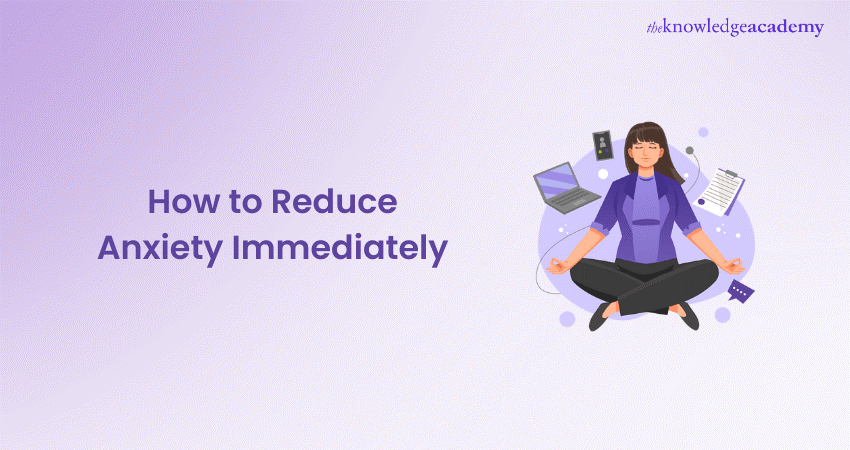
Do simple tasks get you all worked up? Does it get your heart racing and make it hard for you to breathe? That could be a sign of Anxiety. Don't worry; this is a feeling you can easily overcome if you know How to Reduce Anxiety Immediately!
Anxiety is a common experience that can disrupt your day and leave you feeling out of sorts. Fortunately, there are quick and effective ways to manage it. In this blog, we’ll explore practical steps and techniques on How to Reduce Anxiety Immediately.
So you can find calm and clarity when needed. Whether you're dealing with a sudden panic attack or a general sense of unease, these strategies will help you regain control and feel more centred.
Table of Contents
1) What is Anxiety?
2) Symptoms of Anxiety
3) How to Reduce Anxiety Instantly?
4) Reduce Anxiety with long-term Changes
5) Things to Avoid During Anxiety
6) Conclusion
What is Anxiety?
Imagine standing at the edge of a vast forest. The sky is clear, but a storm looms in the distance. As you step into the forest, every rustle and shadow plays tricks on your mind. Anxiety feels like this constant sense of unease as if danger is always nearby.
Your body’s alarm system is in overdrive, making your heart race and mind swirl with “what ifs.” It's the feeling of dread before a presentation, the tightness in your chest awaiting news, and the sleepless nights of worry. Anxiety is an overzealous guardian, trying to protect you but often leading you down paths of unnecessary fear.
It’s your body’s way of signalling that you need to be alert and prepared for a potential challenge. While occasional Anxiety is normal and can even be beneficial, persistent or intense, Anxiety can interfere with your daily life and overall well-being.
Symptoms of Anxiety
The first step in managing your Anxiety is by identifying your symptoms. Here are some of the common symptoms of Anxiety:
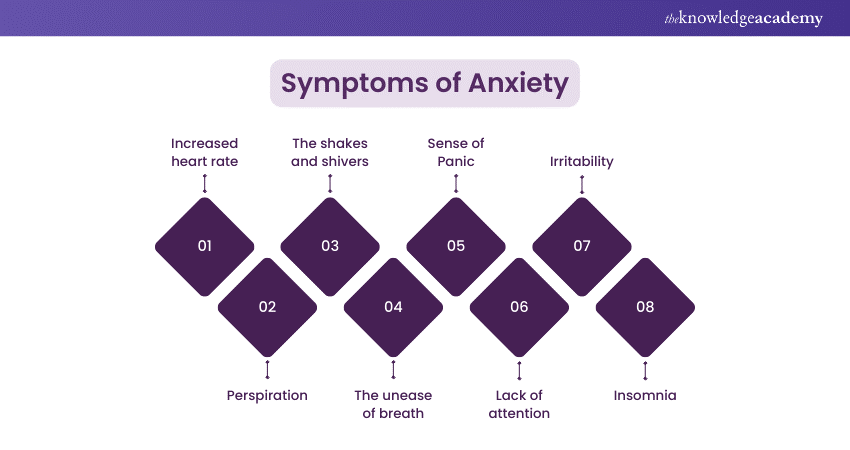
a) Increased heart rate: You might feel a pounding in your chest; this is a spike in your heart rate.
b) Perspiration: You may break a sweat even if the environment is cold
c) The shakes and shivers: Your limbs or whole body might shiver
d) The unease of breath: You may feel a shortness of breath, like it's hard to breathe. This may result in the feeling of choking or a painful lump in your throat.
e) Sense of Panic: You may experience an overwhelming sense of doom, or fear can take over.
f) Lack of attention: You might experience a slight brain fog and find it hard to focus on things around you.
g) Irritability: You might snap at others or feel unusually cranky when people approach you.
h) Insomnia: You may struggle falling or staying asleep, which is common with Anxiety.
How to Reduce Anxiety Instantly?
When anxiety strikes, it’s beneficial to have a handful of strategies ready that can swiftly alleviate your unease. Here’s how to reduce Anxiety immediately:
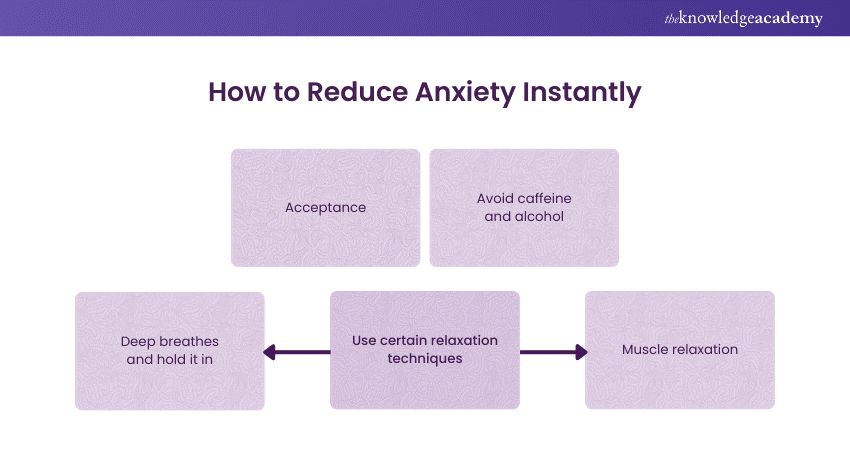
Acceptance
Acknowledging that you're anxious can be a powerful step towards calming down. Denying or fighting Anxiety often makes it worse. Instead, tell yourself, “I’m anxious right now, and it’s okay.” Accepting it can help reduce the intensity of your Anxiety and help you move forward with a clearer mind.
Avoid caffeine and alcohol
Caffeine and alcohol can increase your heart rate and worsen your symptoms. Instead, drinking water can help with dehydration; you can also use the Sheldon Cooper method of herbal teas or Prof.Lupin's method of chocolate when anxious. These alternatives can help keep your body calm and hydrated, thereby reducing the likelihood of anxiety spikes.
Bonus tip: A secret to reduce your Anxiety quickly is sour candy! Who knew candy could make Anxiety better? The sudden change of taste in your mouth surprises your nervous system. Your mind focuses on the taste rather than your trigger, which helps calm you down.
Use certain relaxation techniques
Relaxation techniques can provide quick relief from Anxiety. Here are a few to try:
Deep breathes and hold it in
A popular technique to calm Anxiety is called square breathing. You inhale to four counts, hold it in for four counts, exhale for four counts, and wait for four counts before you inhale again.
This helps regulate your breathing pattern. A tip from acting school suggests that if you want to experience something, you must breathe like you are there! Breathing in a calm manner will help you calm down.
Muscle relaxation
Progressive muscle relaxation is also a great technique to calm your nerves. It involves tensing and slowly releasing each muscle group, starting from your toes and working up to your head. This technique can help release physical tension and promote relaxation.
Learn to manage stress mindfully and build resilience with our Handle Stress And Develop Your Resilience Training - register now!
Reduce Anxiety with Long-term Changes
While immediate strategies are helpful, incorporating long-term changes can reduce the frequency and intensity of Anxiety.
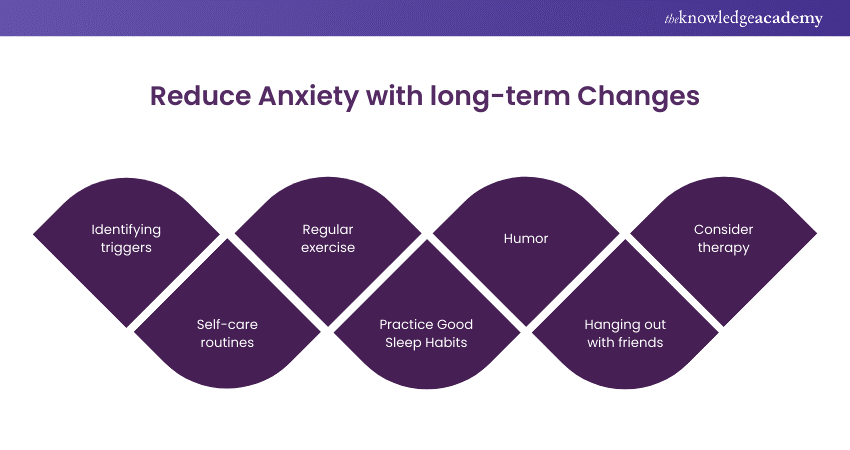
Identifying triggers
Often, your Anxiety stems from triggers. Identifying what your triggers are can help you manage it better. Keep a journal of your anxiety episodes and look for patterns or common triggers. This awareness can help you avoid or prepare for situations that typically cause Anxiety.
Self-care routines
Staying healthy and keeping a balance between work, family, and other obligations is crucial. Also do things that make you happy, like skincare, walk in nature, or going on a vacation. Do not forget to pamper yourself once in a while.
Tip: It is always good to get a massage because it helps to work out the stress in your body and your mind if you ever need it.
Regular exercise
Exercise is effective in decreasing Anxiety. Ideally, you should aim to do at least 30 minutes of moderate exercise on most days of the week. Exercise also relieves muscles tightening due to stress and the release of endorphins, nature’s own feel good hormone, subsides stress hormones.
Practice good sleep habits
Adequate sleep is crucial for the healthy functioning of the mind. Go to bed and wake up at the same time every day, ensure the sleeping area is conducive to sleep, and avoid using electronic devices before bedtime. Getting 7-9 hours of good sleep can make a big difference in how much Anxiety you will have during the day.
Humour
Among the finest natural antidotes for anxiety is humour. Consider indulging in a comedic film, perusing a book filled with jokes, or surrounding yourself with humorous individuals. Humour serves as a potent tool, offering a pause for relaxation and a fresh perspective on situations.
Hanging out with friends
Social support is essential. Take your time with friends and family who can offer a listening ear and a shoulder to lean on. You should get out and do stuff to take your mind off Anxiety and know that you are not the only one suffering.
Consider therapy
Anxiety can be well managed through Professional Therapy. Cognitive Behavioural Therapy (CBT) and other techniques can help you better manage it. A therapist can assist you in learning more about your Anxiety and creating specific interventions.
Aid in creating a safe space for everyone around you with our Mindfulness Training - sign up now!
Things to Avoid During Anxiety
Certain behaviours and substances can worsen Anxiety. Here are a few ways you can avoid feeling anxious:
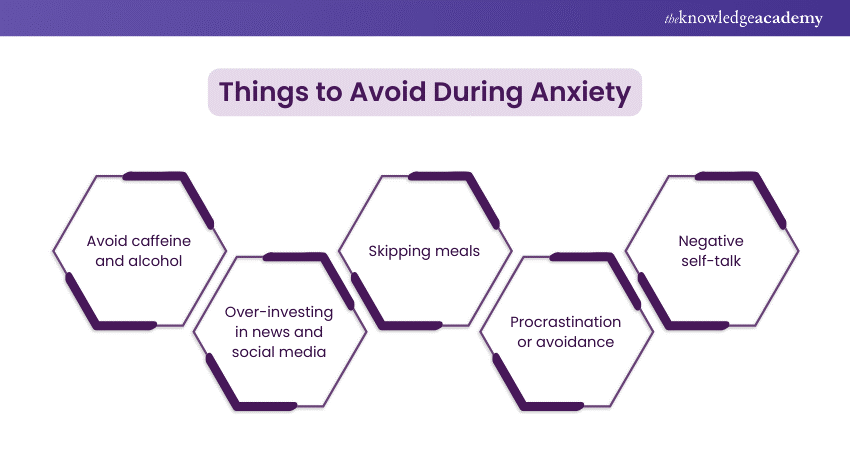
a) Skipping meals: It is known that anxiety-like symptoms can also be caused by low blood sugar.
b) Procrastination or avoidance: Procrastination leads to stress and Anxiety since tasks are done at the last minute.
c) Negative self-talk: By focusing on criticism or negativity about the self, one may experience heightened levels of Anxiety and lowered self-esteem.
d) Avoid caffeine and alcohol: These can worsen the symptoms of Anxiety and interfere with your ability to get to sleep.
e) Over-investing in social media: Staying always updated in social media can make people feel more anxious due to the rather negative nature of certain messages.
Conclusion
You don’t necessarily have to go through the rest of your life being overwhelmed by anxiety. In this blog, you will find out How to Reduce Anxiety Immediately by learning about your symptoms and how to manage them in the short term and/or the long term. Just remember that seeking help to establish some order in your life is alright.
Learn how you can prevent psychological distress that can lead to extreme adversities - sign up for our Prevention Psychology Training now!
Frequently Asked Questions

Immediate relief can often be felt within minutes to hours, especially with techniques like deep breathing and muscle relaxation. Long-term strategies may take weeks to months to show full benefits, but combining both can provide comprehensive relief. However, consistency is critical to managing Anxiety effectively

The inability to sleep can get your mind racing and feeling anxious and depressed. Additionally, the lack of sleep can cause hormonal imbalances that also make you feel low and anxious.

The Knowledge Academy takes global learning to new heights, offering over 30,000 online courses across 490+ locations in 220 countries. This expansive reach ensures accessibility and convenience for learners worldwide.
Alongside our diverse Online Course Catalogue, encompassing 17 major categories, we go the extra mile by providing a plethora of free educational Online Resources like News updates, Blogs, videos, webinars, and interview questions. Tailoring learning experiences further, professionals can maximise value with customisable Course Bundles of TKA.

The Knowledge Academy’s Knowledge Pass, a prepaid voucher, adds another layer of flexibility, allowing course bookings over a 12-month period. Join us on a journey where education knows no bounds.

The Knowledge Academy offers various Health & Safety Courses, including Advance First-Aid Training, Active and Healthy Lifestyle Training, and Counselling Certifications. These courses cater to different skill levels, providing comprehensive insights into Healthy Lifestyle Tips.
Our Health & Safety Blogs cover a range of topics related to Mental Health, offering valuable resources, best practices, and industry insights. Whether you are a beginner or looking to advance your Health and Safety knowledge, The Knowledge Academy's diverse courses and informative blogs have you covered.
Upcoming Health & Safety Resources Batches & Dates
Date
 Anxiety Courses
Anxiety Courses
Fri 21st Feb 2025
Fri 25th Apr 2025
Fri 20th Jun 2025
Fri 22nd Aug 2025
Fri 17th Oct 2025
Fri 19th Dec 2025







 Top Rated Course
Top Rated Course



 If you wish to make any changes to your course, please
If you wish to make any changes to your course, please


